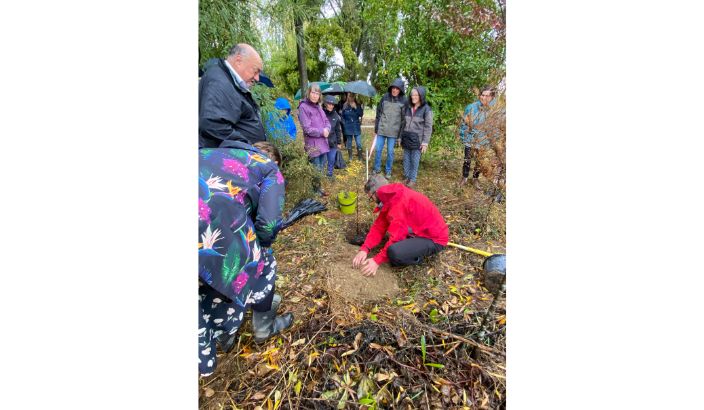Celebration of a quiet and deep-rooted legacy


Community stalwart Ron Sharp was celebrated at the family farm in Riwaka this month, one year after his death. Photo: Supplied.
A quiet man, who steadfastly did what he believed was right and stood beside people who lived on the margins, has been honoured by his family and friends with the unveiling of a crafted bench seat.
Ron Sharp, a gentle and understated Motueka stalwart, passed away a year ago this month, aged 86. A group of friends and family, including his children Nicole and Daniel and his wife Edith, gathered recently to celebrate the man who worked tirelessly behind the scenes to make the community a better and kinder place.
A driving force behind the foundation of the Motueka Community Gardens, Ron was also involved with Motueka Community House, the Abel Tasman Education Trust, Catholic Social Teaching, Green Dollar or skill-swap programmes, and many other groups and charities besides.
Ron was strongly involved and invested in his community and would attend almost any community meeting going, although in his later years, he could be found catching up on sleep as well as matters arising.

A carved two-person bench seat, rich with symbolism, will sit patiently on the family farm in Riwaka, as a memorial to a man who loved to stop to ponder life’s wonders or pause for a yarn with a friend.
Crafted by Ron’s friend Terry Parkin, the seat is crafted from elm, totara, eucalyptus seligna, kauri and matai – all giants within the forest, “like Ron in his quiet humble way,” reflects his daughter Nicole.
“Ron’s life was like a waka, sending ripples to the furthest shores.”
An emblem on the back of the memorial seat reads, “In loving memory of Ron Sharp. Forever the peaceful warrior. Planting seeds of hope and acceptance in all our hearts”.
The day of the unveiling was one of heavy rain, but Nicole knew that her father, a keen gardener, would have wholeheartedly approved.
“The land needed it more than we needed the sun – it was quite fitting,” she says fondly.
Ron had trained as a Catholic priest but his progressive and humanist mindset led him to a life of helping people outside of the formal confines of the church.
“He always believed in the goodness of humanity, and that change is possible,” Nicole says.
She never saw much of a fighter in her gentle father, a man who went everywhere on pushbike and loved a good singalong. However, she knows through many other people’s stories that he would battle untiringly in the underdog’s corner.
“He really stood up for the people who were mistreated,” she says, recounting how Ron had stood beside Ngāti Whātua at Bastion Point, and marched against the Springbok Tour.
Tara Forde, a long-time collaborator and friend, says that there was probably not a committee or group in Motueka that Ron was not involved with in some way.
She remembers him as a “steady and persistent force for good in the world”.
“His calm demeanour held hope for a better world – one where all people are valued for who they are and what they have to contribute.”
She says that Ron always had a well-considered way to help, and she offered thanks to him for “seeing the best in me and so many others”.
